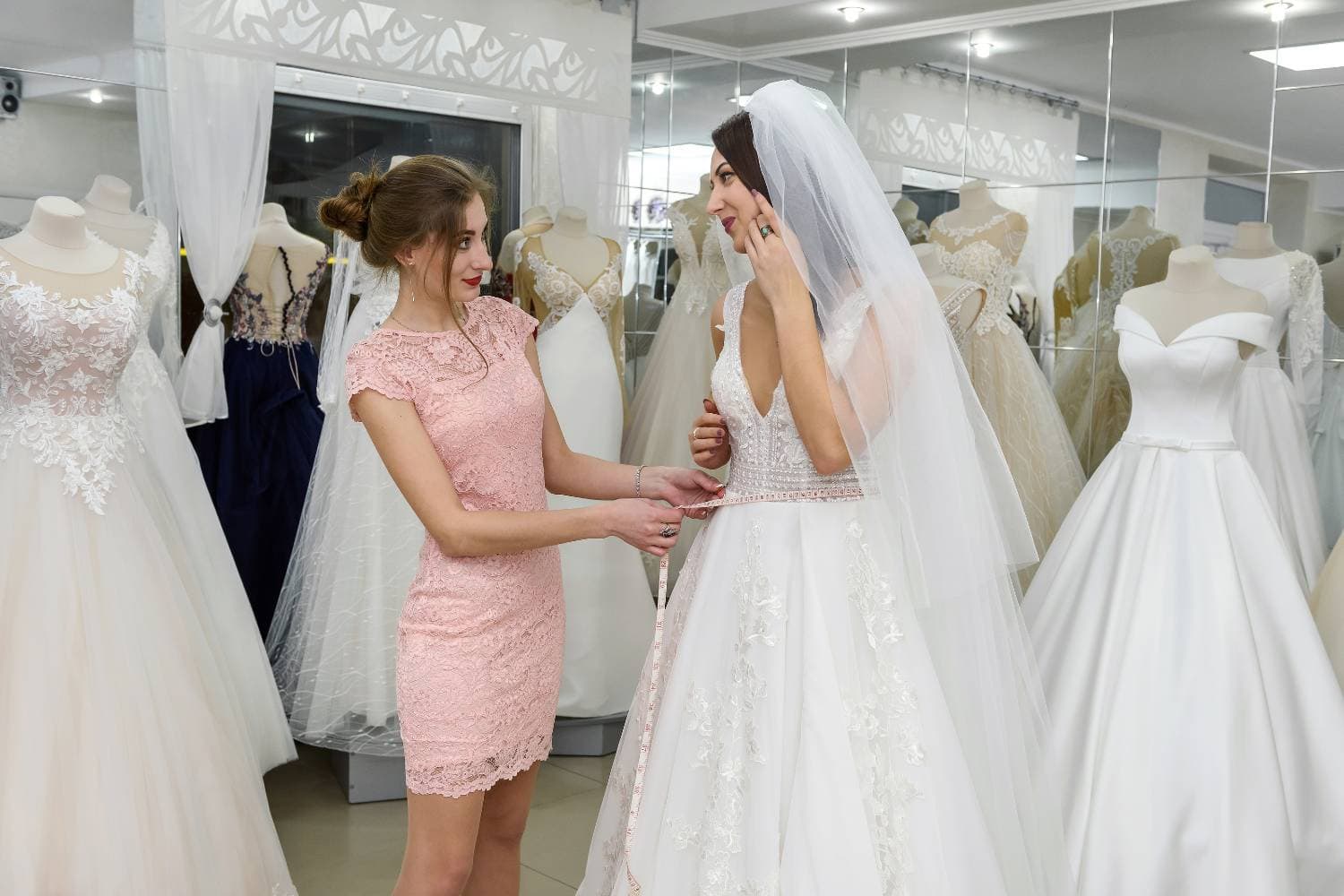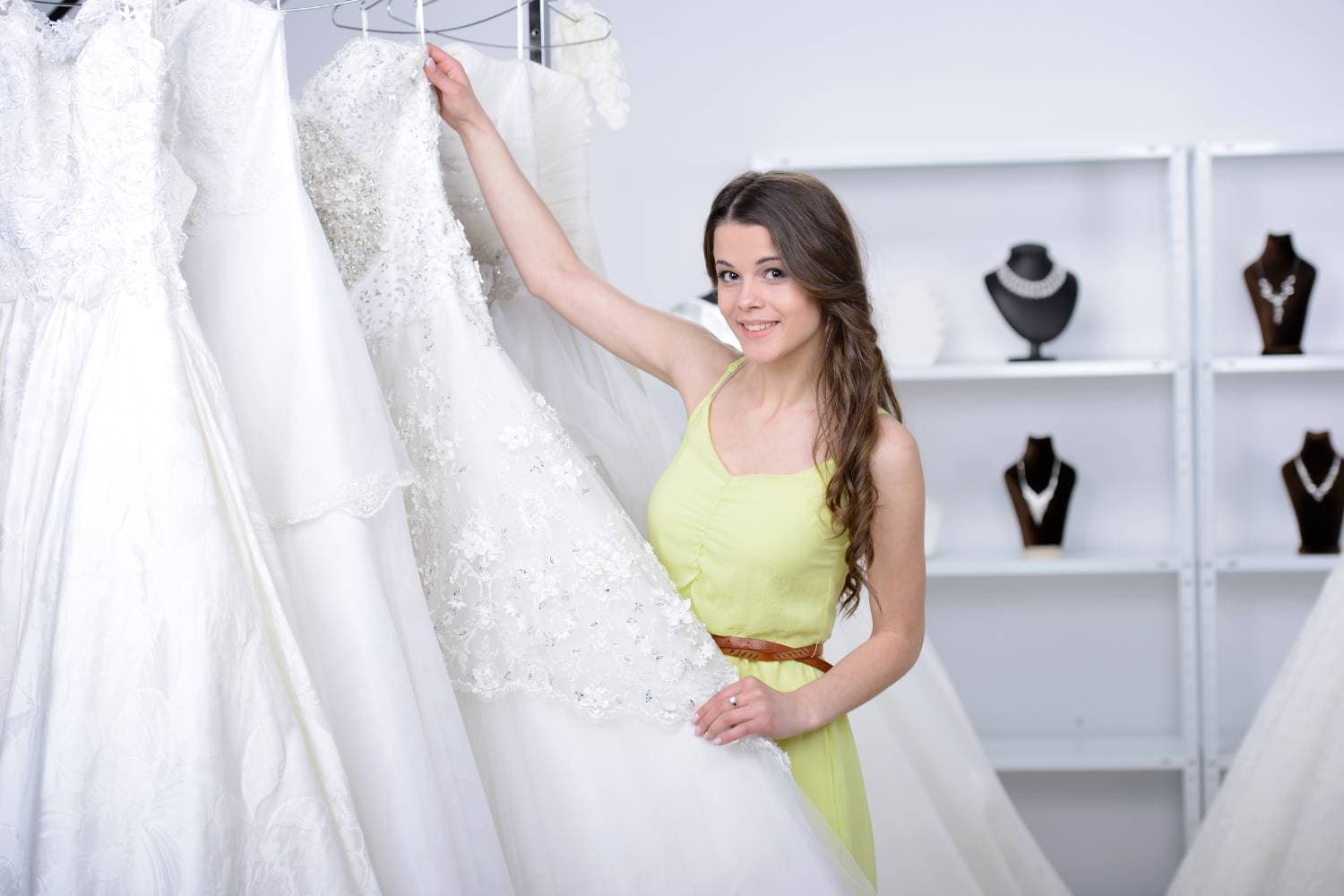Shopping for your wedding dress is one of the most exciting parts of planning your big day, but it can also be overwhelming. With so many options and opinions, it’s easy to make mistakes.
Here, we focus on what not to do when wedding dress shopping, helping you avoid common pitfalls so you can find the perfect dress without unnecessary stress.
Let’s get straight to the point
Wedding dress shopping can be exciting but also overwhelming. Avoid common mistakes by starting early (9-12 months before the wedding), limiting your entourage to a few trusted people, and setting a firm budget that includes extras like alterations.
Don’t try on too many dresses, and keep an open mind about different styles. Prioritise comfort over trends and focus on timeless designs.
Research bridal salons thoroughly, and wait until you’ve chosen your dress before buying accessories. Finally, take your time, ask questions, and avoid being pressured into a rushed decision.
1. Don’t Wait Too Long To Start Shopping
Start Early
One of the biggest mistakes brides make is waiting too long to start their search. Ideally, you should begin shopping 9 to 12 months before your wedding.
Dresses are often made to order and require several months to be produced and altered.
Waiting too long can limit your options and lead to rushed decisions. If you’re short on time, be prepared to be flexible with your choices.
Don’t Underestimate The Time Needed For Alterations
Alterations are a standard part of wedding dress shopping. Even if the dress fits you well, small adjustments will be needed to ensure it fits perfectly.
Rushed alterations can lead to poorly fitting gowns, which no bride wants on her big day. Always leave enough time for at least two to three fittings.
2. Don’t Bring Too Many People
Limit Your Entourage
While it might seem fun to bring your entire bridal party, along with friends and family, it’s actually a common mistake.
Too many opinions can overwhelm you and make the decision-making process more difficult.
Instead, bring two to three trusted people whose opinions you truly value. This will help you stay focused and reduce confusion.
Avoid Conflicting Opinions
Each person you bring will have their own taste and ideas about what looks best. Too many voices can cloud your judgment. The wedding dress is your choice, so keep your audience small and composed of those who support your vision.
3. Don’t Try On Too Many Dresses
Set A Limit
It’s tempting to try on as many dresses as possible, but trying on too many can lead to decision fatigue and confusion. Most experts recommend brides try on four to seven dresses.
Trying on more than 10 dresses is unnecessary and often makes the final choice harder. Focus on quality over quantity to avoid overwhelming yourself.
Stick To A Few Stores
Similarly, limit the number of stores you visit. Going to more than three or four bridal salons can result in too many options, leaving you more confused than when you started. Do some research beforehand, narrow down your favourites, and stick to those.
4. Don’t Ignore Your Budget
Set A Clear Budget
Another major mistake is not setting a firm budget before you start shopping. Wedding dresses vary greatly in price, and it’s important to stay realistic about what you can afford.
Set a budget before you walk into a store and make sure the consultant knows it. This prevents the heartache of falling in love with a dress that’s way out of your price range.
Account For Extra Costs
The cost of a dress isn’t just the price tag. You’ll need to account for alterations, accessories, shoes, and cleaning.
These costs can add up quickly, so keep them in mind when setting your budget. Don’t make the mistake of stretching your budget too thin by forgetting these extras.
5. Don’t Be Afraid To Try Something New
Keep An Open Mind
You may have a specific dress style in mind, but sometimes, the dress you fall in love with is completely different. Don’t make the mistake of dismissing suggestions from your consultant.
Be open to trying on different styles—even ones you didn’t initially consider. Many brides are surprised when the dress they love is not the one they expected.
Avoid Judging A Dress On The Hanger
Wedding dresses often look different on the hanger than they do on your body. Don’t be too quick to say “no” to a dress based on its appearance in the store.
It’s common for brides to fall in love with dresses that didn’t stand out at first glance. Trust your consultant and try on a variety of styles to find the one that fits and flatters you best.
6. Don’t Forget About Comfort
Choose Comfort Over Trend
It’s easy to get swept up in choosing a dress based on trends or looks, but comfort is key. You’ll be wearing the dress for several hours, so it’s essential that you feel comfortable and can move easily.
Avoid dresses that are too tight, too heavy, or too complicated to manage. You’ll thank yourself on your wedding day when you’re able to dance, eat, and enjoy yourself without feeling restricted.
Pay Attention To How The Dress Feels
When you’re trying on dresses, pay attention to how the fabric feels on your skin. It’s not just about how it looks in the mirror.
Itching or discomfort can ruin your experience. If a dress looks beautiful but feels uncomfortable, keep looking. You want to feel as good as you look.
7. Don’t Get Caught Up In Trends
Choose Timeless Over Trendy
Wedding dress trends come and go, but your wedding photos will last forever. It’s important to choose a dress that feels timeless rather than something that’s just trendy.
Avoid the mistake of picking a gown simply because it’s the latest style. Focus on a dress that makes you feel like the best version of yourself.
Consider Classic Styles
Classic dress styles, such as A-line, ball gown, and mermaid, have stood the test of time for a reason.
These styles flatter many body types and create elegant, timeless looks. While it’s fine to incorporate elements of current trends, avoid basing your entire decision on a passing fad.
8. Don’t Skip The Research
Do Your Homework
Before heading to a bridal salon, make sure you’ve done some research. Familiarise yourself with different styles, designers, and fabrics.
This will make it easier for you to communicate with your consultant and avoid wasting time on dresses that don’t suit your taste or body type.
Research The Store
Also, research the bridal salons you plan to visit. Look at reviews and recommendations to ensure they have good customer service and carry dresses within your budget. Not all salons are created equal, and a little preparation can save you a lot of hassle.
9. Don’t Forget The Accessories
Consider The Whole Look
It’s easy to get so focused on the dress that you forget about the accessories. Don’t make this mistake.
Veils, jewellery, shoes, and undergarments all play a role in completing your look. When trying on dresses, think about how they’ll pair with these accessories.
Don’t Buy Accessories Too Early
However, avoid purchasing accessories too early in the process. Wait until you’ve chosen your dress before buying shoes, jewellery, or a veil. That way, you can ensure everything complements your gown perfectly and avoids unnecessary returns.
10. Don’t Be Pressured Into A Decision
Take Your Time
Finding the right dress is a big decision, and there’s no need to rush. Some brides feel pressured to buy a dress on the spot, especially if they’ve brought an entourage. Take your time, sleep on it, and ensure you’re confident in your decision before making a purchase.
Avoid Sales Pressure
Consultants are there to help you, but some may apply pressure to make a sale. Don’t let yourself feel rushed or pressured into buying a dress before you’re ready.
A good consultant will support you through the decision-making process without pushing you towards something you’re unsure of.
11. Don’t Forget To Ask Questions
Clarify Return Policies
Most wedding dresses are final sale, meaning you can’t return or exchange them once they’re ordered.
Be sure to ask the salon about their return policies so you’re not caught off guard later. This is especially important if you’re unsure about a specific dress.
Ask About Alteration Costs
Alteration costs can vary significantly, so it’s important to ask about this upfront.
Make sure you know what alterations are included in the dress price and what will cost extra. Budgeting for alterations can save you from unexpected expenses down the line.
Conclusion
Wedding dress shopping should be an enjoyable and memorable experience, but avoiding common pitfalls can make all the difference.
By starting your search early, keeping your entourage small, sticking to a budget, and staying open to different styles, you’ll reduce stress and increase your chances of finding the perfect gown.
Prioritise comfort, timeless elegance, and thorough research, while also allowing yourself the freedom to enjoy the process.
With the right mindset and preparation, you’ll walk down the aisle in a dress that not only looks stunning but feels perfect for you. Happy shopping!
Frequently Asked Questions
What Do Guests Wear to Bridal Dress Shopping?
The short answer: Guests can wear anything they want as the bride goes wedding dress shopping.
How Many Dresses Do Brides Try On?
Most brides try on between four and seven gowns, said DeMarco, and shouldn’t try on more than 10, because it can lead to confusion.
Often, a bride is trying on dress after dress because she’s just not ready to end the shopping experience and make a real commitment.
Can Your Fiancé See Your Wedding Dress?
Ultimately, this decision is yours, but most grooms agree they want to be surprised by their future wife’s wedding dress on the day of the wedding.
If your partner is open to seeing your dress ahead of the wedding, and if you value their opinion in the world of fashion, you can certainly invite them along.
Does the Groom’s Mother Go Wedding Dress Shopping?
Traditional etiquette dictates that the mother of the bride takes the lead and shops for her wedding attire first; then, the mother of the groom can choose her dress. However, many modern women use this advice as more of a guideline than a strict rule.
Can You Wear Makeup When Trying On Wedding Dresses?
You don’t want to be responsible for paying for a dress that you do not like because your makeup got on the gown, so we recommend wearing minimal amounts of makeup. However, you also don’t want to show up to your appointment looking like you just rolled out of bed.



